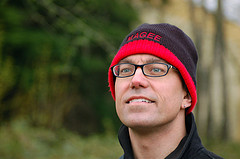The Man Who Coined Digital Executor
About 18 months ago, just as I was making it known that I was researching digital legacy issues, several friends told me about Derek K. Miller and that I needed to have a conversation with him. Well today, that finally happened.
Derek lives in Vancouver, British Columbia and is as close to a digital native as a (soon-to-be) 40-year-old could possibly be. He told me stories of dialing into mainframes in the ‘83, and of being active on BBS and other early web-sharing activities. Derek has had a web site for more than 20 years and has been blogging for 10 years. He’s also a writer, editor, musician, photographer, podcaster, husband, father and tech guy. And he’s fighting stage 4 metastatic colorectal cancer, which is one reason why he has given much thought and consideration to the idea of digital legacy over the last few years.
To best estimates, Derek is the first person on record to use the term “digital executor.”
Spark
Way back on April 30, 2008, Derek appeared on a CBC radio show called “Spark” hosted by Nora Young. (Listen to the 20 minute interview.) On it, he talked about having such a vast amount of content online and the need for people to have a digital executor to carry out your wishes after you’ve passed away. Back then, he discussed many of the same concepts and concerns that I’ve been exploring.
I read in the Spark blog comments that host Nora Young stated,
I can imagine a whole new category of ‘personal digital archivists’.
The timing of this comment is particularly interesting because it was in spring and summer 2008 that Bob Stewart founded VitalLock and Jeremy Toeman came up with the idea for Legacy Locker.
It is also at that same time that I had a seminal discussion about this topic with a group of developers and techno-early-adopters about what happens to your online communities and digital footprint when you die. It was that discussion that inspired me to dig deeper, and which has led me to research, write and speak about digital legacy issues.
Fast forward two years, and after my presentation at webcom, a discussion sprang up on Twitter and Derek’s name was raised as being the person who coined the term “digital executor.” Within a short time, Derek and I had made arrangements to have Skype chat and it was a thrill to finally speak with him today . (I promise to blog more about that chat another time but you can read about some of it in Derek’s post.)
Dave or Derek?
Derek echoed what he had said 2 years previous, that Dave Winer (the creator of RSS and pioneer in blogging and CMS technology) was early out of the gate writing about the longevity of his digital content in March of 2007, one whole year before the Spark interview.
I realized that if I were to die now, my web presence might last a month or two, but probably not much longer. … If I want these things to last, I realized, I would have to invest to future-proof the content, as best as I can.
Despite Dave Winer’s advanced thinking on the preservation of content, he did not once use the term”digital executor.” So, unless someone can prove to me otherwise, I’m going to credit Derek K. Miller with being the first to use the term “digital executor.”
What a privilege it was to get Derek’s perspective on digital legacy issues. I look forward to our next conversation.
Comments
One Response to “The Man Who Coined Digital Executor”
Leave a Reply




Via Twitter, found my way to this post. It’s funny, because I’ve been occasionally musing on this issue for a while. I may have, in fact, accidentally influenced Derek’s thinking, too–we’d read each other’s blogs for a long time.
Back in 2003, I called something similar a “computer mortician”. I like Derek’s term much better.
Here’s what I wrote:
http://www.darrenbarefoot.com/categories/internet/2003/07/31.html#a458
“In truth, Steve’s entry reminded me of a business idea I had a while back. It probably already exists, but here it is: computer mortician. When someone dies, their immediate family may not be computer-literate, or may not be aware of the deceased computer usage (passwords, online presences, etc). So, you call my company, we come and conduct an autopsy on their computer(s). We organize all of their data, etc, into some neatly packaged form and hand it to the family like an urn of their ashes. They write us a big fat cheque and we go home.”
Now I gather there a bunch of companies who do this. Who knew?